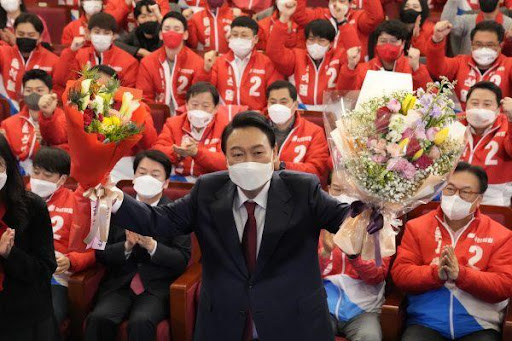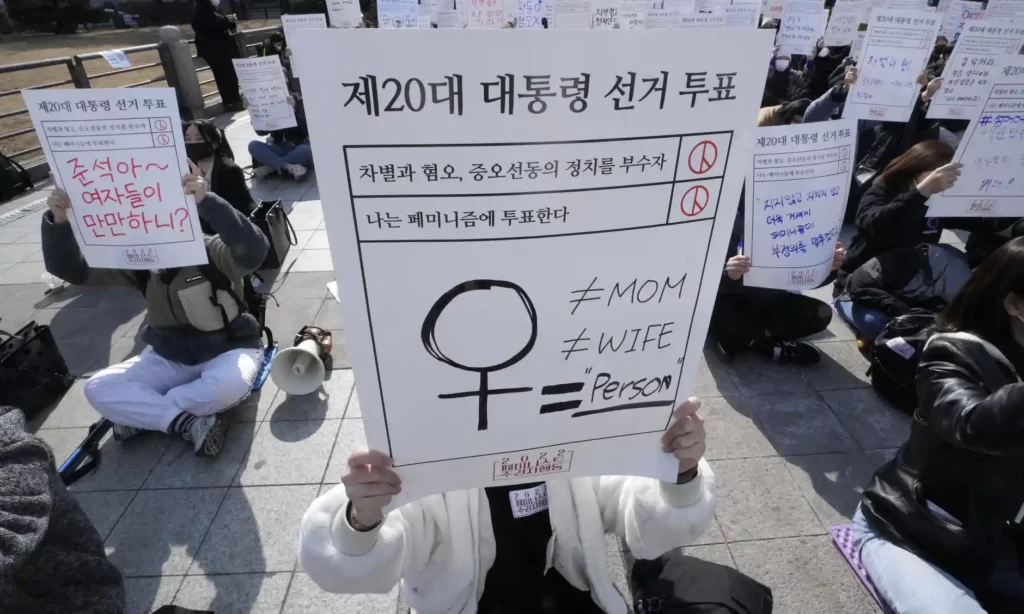Although living in one of the most rapidly growing and industrialized countries in the world, South Korean women still have many hurdles to overcome in achieving equal treatment from the various sectors of its society even now, more than ever.

(Credit: AP Photo/Lee Jin-man, Pool)
A long road to gender equality
According to a research conducted by Barro and Lee in 2013, the share of adults in South Korea who had completed their secondary school education or higher increased from 20% to a high percentage of 87%. This has proven to be one of the greatest contributing factors to South Korea’s most expeditious industrialization and development from 1960 to 2013. The ever increasing rate of secondary school and higher education, the prevalence rate of women in managerial levels of careers in law, medicine, and other services have become the most prominent so-called successful promotion of gender equality.
The effort of pursuing gender equality went on up until 2017, when President Moon Jae-in campaigned his very own agenda: to diminish gender inequality. Through enactment of policies to alleviate gender wage gap, movements that root in the pressing issue of femicides and sexual harrassments, legalization of abortion, to demanding prosecutions for nonconsensual disclosure of private images – or also known as South Korea’s own version of #MeToo movement, held in October 2017 – President Moon became popularly known as the liberal president of South Korea.
Despite these great numbers and progressive movements being taken, in 2020, South Korea is still in the first position among 38 members of Organization for Economic Cooperation and Development (OECD) with the largest gender wage gap between male and female employees. South Korea presented a 31.5% gender wage gap in 2020, which also means women earned 31.5% less than men, and it is likely to be the highest percentage in comparison to previous years’ data.
One of the factors taken into account was how this gap was a consequence of suspension in careers for South Korea’s young mothers who wished to reenter the workforce. Having a child or children is considered an obstacle since this raises an uncatered need for a flexible working environment and certified childcare facilities among these young mothers. The closest thing South Koreans’ women and young mothers have to a social driver in the government institution is the Ministry of Gender Equality and Family.
Unrecognized vital achievements of the Ministry
Established in 2001, the department has been advocating the needs for coordination of women’s policy and improvement of women’s welfare. Alongside this, it also focuses on support for family policy and multicultural family policy, providing access to protection for the youth. According to South Korean activist Kim Do Kyung, the ministry even managed to abolish a very vital part of South Korea’s patriarchal system: the “hoju” registry. A system in which only a male member is considered the legal head of a family with all the family members listed under the hoju.
However vital these achievements and objectives were, Yoon Seok-yeol, now South Korea’s president, pledged to eliminate the Ministry of Gender Equality and Family. The president posted a statement via Facebook page, “Abolition of the Ministry of Gender Equality and Family,” with no further explanation from his People’s Power Party (PPP). The abolishment of the Ministry of Gender Equality and Family has been campaigned due to the reason that Yoon considered the ministry as “obsolete” and the budget for the ministry itself can be allocated for other priorities of the country, such as defense. According to The Korea Herald, Yoon’s objective of the ministry’s abolishment won’t create any major changes since the Ministry of Gender Equality and Family has the least spendings in comparison to any other departments.
Public responses, outcry, and support
Another remark coming from Willem Adema, senior economist in the OECD’s social policy division told HRM Asia, “Not all OECD countries have a Ministry for Gender Equality, but there are always public agencies that further gender equality in public life — either housed within another ministry or, for example a Prime Minister’s or Cabinet Office,” he stated “However, gender inequalities in other OECD countries are often not as large as in Korea. Hence, the abolition of the Ministry of Gender Equality seems rather premature and gives completely the wrong policy signal.”

Photograph: Ahn Young-joon/AP
Alongside the abolishment campaign, Yoon stated that it is highly irrelevant that women suffer from “systemic gender discrimination” and South Koreans should eliminate such preferential treatments to women. Based on Realmeter’s survey, nearly 52% of respondents are leaning towards the idea of abolishing the ministry. This survey aligned with the vote results. His ‘anti-feminist’ agenda has evidently gained an abundant support from young male voters who view gender equality movement as “residing to women’s interest only” rather than accommodating all genders along the movement, neglecting especially the men.
Yoon also received various negative reactions from the public and one of them is a publication of a statement from civil society, human rights, and gender equality organizations, along with individual activists and scholars. The statement called on President Yoon and the PPP to take serious concerns regarding the deepening socioeconomic and gender inequality as an unfortunate impact of COVID-19 and to withdraw the plan to abolish the Ministry of Gender Equality and Family of South Korea. Yoon and the PPP has not yet given any response or further transparency regarding the abolishment plan.
Penulis: Arindha Syakira
Reporter: Arindha Syakira
Editor: Audi Faritz
Foto: Lee Jin-man, Pool/AP; Ahn Young-joon/AP


